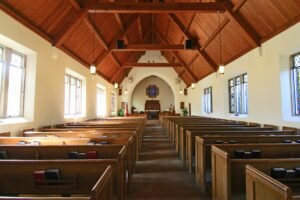March 18, 2012; Source: Journal Gazette
In the wake of the collapse of the West Coast fiscal sponsor, the International Humanities Center, there has been some increase in attention to fiscal sponsors in general—and specifically to fiscal sponsors that are in financial trouble, thereby putting their sponsored projects in great jeopardy. In Fort Wayne, Ind., a nonprofit called Christian Community, Inc. run by a Rev. Steven E. Clapp has collapsed and left at least two organizations—the Connecticut-based Religious Institute and the Washington, D.C.-based Many Voices—high and dry and out of perhaps $600,000 that Clapp’s organization supposedly held for them.
Religious Institute Executive Director Rev. Debra Haffner uses words such as “shock” and “betrayal” to describe her organization’s feelings toward Christian Community. Haffner says that the Religious Institute is out $424,000 plus a $100,000 loan she and her husband made to Christian Community itself. Many Voices says that it is “in a heartbreaking financial position,” having lost $75,000 in the Christian Community collapse.
The two nonprofits sponsored by Christian Community allege malfeasance on Clapp’s part, but he cops only to “‘mismanagement’ and ‘incompetency’—both of which I’m guilty of….There was never any intention to betray.” Clapp informed both groups in February that Christian Community was bankrupt due to poor financial decisions. One such decision might have been the fact that Clapp hadn’t filed a 990 for his nonprofit since 2007, causing the IRS to pull its tax-exempt status last May.
Although nominally a fiscal sponsor, Clapp describes Christian Community as a partner with its sponsored groups. In his mind, that meant that Christian Community would pay their bills if the sponsored groups ran short, and as a corollary, Christian Community would be able to use their moneys to pay its expenses. In other words, Clapp had turned fiscal sponsorship, which would in theory maintain segregated accounts for its projects, into a financial mélange where no one but Clapp would know how much money was being spent or for what purposes it was spent. Old images of the Christian Community website show Clapp describing the Religious Institute and other organizations as partners, with Clapp on the board of Media for Living and closely connected to other Christian Community partners.
Sign up for our free newsletters
Subscribe to NPQ's newsletters to have our top stories delivered directly to your inbox.
By signing up, you agree to our privacy policy and terms of use, and to receive messages from NPQ and our partners.
What constitutes Christian Community’s fiscal sponsorship function versus its educational and technical assistance role with church congregations is not clear, but the Indiana attorney general’s office says that it has receive two consumer complaints about loans of $75,000 and $100,000 at a 10 percent interest rate made to Christian Community by the sister and mother of the Religious Institute’s Debra Haffner that were never repaid. Those don’t appear to be typical loans, but something of a Ponzi scheme that Clapp ran, promising investors a ten percent return on money they invested in or with him.
Clapp was hardly an invisible faith-based activist. Until the collapse of Christian Community, Clapp had board roles with the Religious Coalition for Reproductive Choice and Planned Parenthood of Indiana. But Clapp should have been known for past activities that were not quite religious or charitable. Dan Stockman, the investigative reporter at the Journal Gazette who broke the news about the Christian Community collapse, reports that Clapp, a former minister, had been indicted in Danville, Ill. in 1986 on fifteen counts of what appears to have been a strategy to swindle two banks by using fake contracts for sales of computers and software to area churches as collateral for loans to two of Clapp’s for-profit companies.
Stockman reports that Clapp then swindled $500,000 from a third bank while out on bail and then skipped town. The faith-based federal fugitive Clapp was caught in March of 1988 at the airport in New Orleans and was subsequently tried and sentenced to 13 years in the slammer and ordered to pay $2.1 million in restitution. He was released after serving 56 months and he then decamped to Fort Wayne.
There are more questions about Clapp. Was he ever really ordained as a minister of the Church of the Brethren, or anyplace at all, after he dropped his affiliation with the United Methodist church? Did he ever receive an MBA from Northwestern University, as his resume indicates? Northwestern has no record of him. Were the audits of Christian Community listed as having been conducted by a certified public accountant named Donald Yocum real? There is no evidence of a CPA named Yocum in either Indiana or Illinois. Was the Christian Community board real and functioning? The three-member board appears to have consisted of Clapp’s spouse, a person who had Alzheimer’s for several years and died in 2004, and one person who seems to be impossible to locate. And was anyone aware that Clapp was on probation for fraud convictions at the time he took over as president of Christian Community?
As NPQ noted in our investigative reporting which broke the story of the collapse of the International Humanities Center (see here and here), the groups turning to nonprofit fiscal sponsors often don’t have the sophistication to know quite what they should be monitoring. In both cases, there was a sense of the sponsor’s figurehead—Steve Sugarman at IHC, Clapp at Christian Community—sharing the politics and beliefs of the sponsored projects, making them less likely to conduct the necessary due diligence. The common characteristic of both the IHC and Christian Community stories is how much the sponsored groups trusted the character and beliefs of their sponsor and how shocked they were to be so clearly abused by the sponsor’s leader. Maybe they should have followed Ronald Reagan’s advice: “Trust, but verify.”—Rick Cohen












